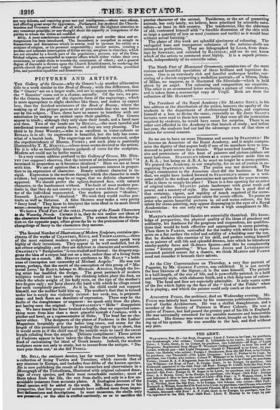So we are to have no more Dioramas and scenes
by STANFIELD ! He is become an Associate of the Royal Academy, and it might compro- mise the dignity of that august body if one of its members were to con- descend to paint scenes for a theatre. What wretched humbug ! The airs and pretensions of this knot of painters and picture-jobbers are most ludicrous. STANFIELD'S talents as a scene-painter made him an A.R. A. ; but being an A. R. A, he must no longer he a scene-painter. We praised the Academy, in our simplicity, for an act of justice in re- cognizing STANFIELD'S merits. The praise was not deserved. The King's commission to the Associate elect did the business. But for that, we might have looked forward to STANFIELD'S scenes as a wel- come relief to the tedium of pantomime and spectacle for years to come. Who is there to supply his place ? There is a fine opening for an artist of original talent. STANLEY paints landscapes with great truth and power, and a mastery of style. His manner also has a good deal of that certainty, vigour, and rapidity of touch required of the scene- painter; and he evinces peculiar talent for scenic effects. To praise an artist who paints beautiful pictures in oil and water-colours, for his talent for scene-painting, may appear disparaging in the eyes of a Royal Academician : we can only say we mean a high compliment to Mr. STANLEY.
MARTIN'S architectural fancies are essentially theatrical. His know- ledge of perspective, the physical quality of his ideas of grandeur and sublimity, his fondness for the gorgeous and stupendous, are qualifica- tions that would be both effective and appropriate in scene-painting. Then there is PARRIS, unrivalled for the reality with which he repre- sents on a flat surface the relief and solidity of a building near the eye. But he disdains this exercise of his skill, and prefers setting himself up as painter of still life and splendid dresses, into which he introduces namby-pamby faces and ill-drawn figures—and this he complacently terms "history- painting." When INIGO JONES and LUTHERBOIIRG invented painted scenes for a theatre, we think MARTIN and PARRIS need not consider it beneath their talents.


























 Previous page
Previous page